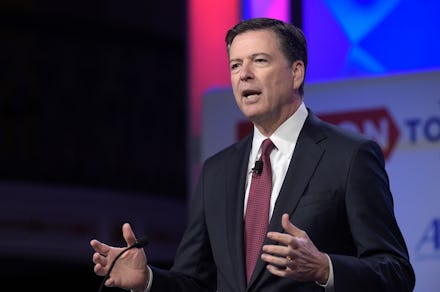Donald Trump has fired FBI Director James Comey

President Donald Trump fired FBI Director James Comey on Tuesday, according to a statement issued by the White House.
"Today, President Donald J. Trump informed FBI Director James Comey that he has been terminated and removed from office," the statement read. "President Trump acted based on the clear recommendations of both Deputy Attorney General Rod Rosenstein and Attorney General Jeff Sessions."
The official rationale behind the decision, according to Rosenstein, was that Comey's handling of the FBI investigation into Democrat Hillary Clinton's use of a private email server had resulted in "substantial damage" to the agency's reputation.
"I cannot defend the director's handling of the conclusion of the investigation of Secretary Clinton's emails, and I do not understand his refusal to accept the nearly universal judgment that he was mistaken," Rosenstein wrote. "Almost everyone agrees that the director made serious mistakes; it is one of the few issues that unites people of diverse perspectives."
Rosenstein cited both Comey's decision to overstep his boundaries and say he did not recommend charges against Clinton, as well as his subsequent decision to "hold press conferences to release derogatory information" about Clinton's use of the server.
But in a dismissal letter, Trump was clearly more preoccupied with thanking Comey for supposedly reassuring him he was not under investigation for his campaign's rumored ties to Russian intelligence operatives who hacked into Democratic email systems before the 2016 elections.
"While I greatly appreciate you informing me, on three separate occasions, that I am not under investigation, I nevertheless concur with the judgement of the Department of Justice that you are not able to effectively lead the Bureau," Trump wrote, noting the value the president saw in an FBI director whom he claimed had cleared him of wrongdoing.
That investigation is, in fact, ongoing, and Comey was in charge of it.
What's more, on Tuesday evening, CNN reported grand jury subpoenas had been issued in the investigation into former national security adviser Michael Flynn, who was fired after lying to other administration officials including Vice President Mike Pence over a secret phone call with Russian ambassador Sergey Kislyak — a clear sign an FBI investigation into the Trump campaign's Russia ties is ongoing.
The issuance of grand jury subpoenas decimates top Trump aide Kellyanne Conway's assertion on CNN Tuesday night that the Russia investigation is over, a comment that led host Anderson Cooper to roll his eyes.
According to CNN's Dana Bash, the Trump administration apparently expected that firing the widely unpopular Comey would result in little controversy.
But Democrats immediately reacted to the firing with thinly veiled accusations that Trump was attempting to defuse the FBI investigation by firing the man in charge of it, noting Rosenstein's rationale conflicted with the president's open glee about the stream of damaging information Comey's FBI released about the Clinton email investigation.
More alarmingly for the White House, several prominent Republicans expressed unease with Trump's decision to fire Comey on Tuesday.
Sen. Richard Burr, the chairman of the Senate Select Committee on Intelligence, tweeted he was "troubled by the timing and reasoning of Director Comey's termination."
Arizona Sen. Jeff Flake tweeted he "spent the last several hours trying to find an acceptable rationale for timing of Comey's firing" but "just can't do it."
Other reporting indicated the Trump administration was not offering a full accounting of events. CNN's Jeff Zeleny reported the president had apparently been considering making the move for "at least a week," though only came up with the rationale after the fact, according to Talking Points Memo.
Comey is the third high-profile federal law enforcement official Trump has terminated in tense circumstances. Shortly after taking office, Trump dismissed acting Attorney General Sally C. Yates for insubordination after she refused to defend his de facto Muslim ban in court. Yates later testified she had told the White House that Flynn had lied about the phone call, potentially exposing himself to blackmail.
Trump also fired Preet Bharara, the popular U.S. attorney for the Southern District of New York, triggering speculation he was trying to prevent Bharara from digging into whether Trump was illegally receiving foreign payments.
As of Tuesday evening, the only response to the outcry from Trump personally was a single Twitter post mocking "Cryin' Chuck," Senate Minority Leader Chuck Schumer, one of the Democrats calling for an investigation. Trump scoffed at how Schumer "acts so indignant" despite Comey's bipartisan unpopularity.
While the White House rationale for Comey's termination was largely greeted with skepticism, the FBI director himself was not above reproach.
On Monday, investigative site ProPublica published a fact-check showing Comey had greatly exaggerated the number of Clinton's emails that had ended up on Anthony Weiner's laptop. While the FBI director told a congressional panel that Clinton aide and Weiner's estranged spouse, Huma Abedin, had forwarded "hundreds and thousands" of emails, "some of which contain classified information" to Weiner, ProPublica reported officials familiar with the investigation said only a handful of emails were manually forwarded and the rest appeared to be Blackberry backups.
The incident raised the question as to whether Comey had perjured himself, though that would be difficult to prove in a court of law.
Tom McKay contributed additional reporting to this story.
May 10, 2017, 12:20 a.m.: This story has been updated.